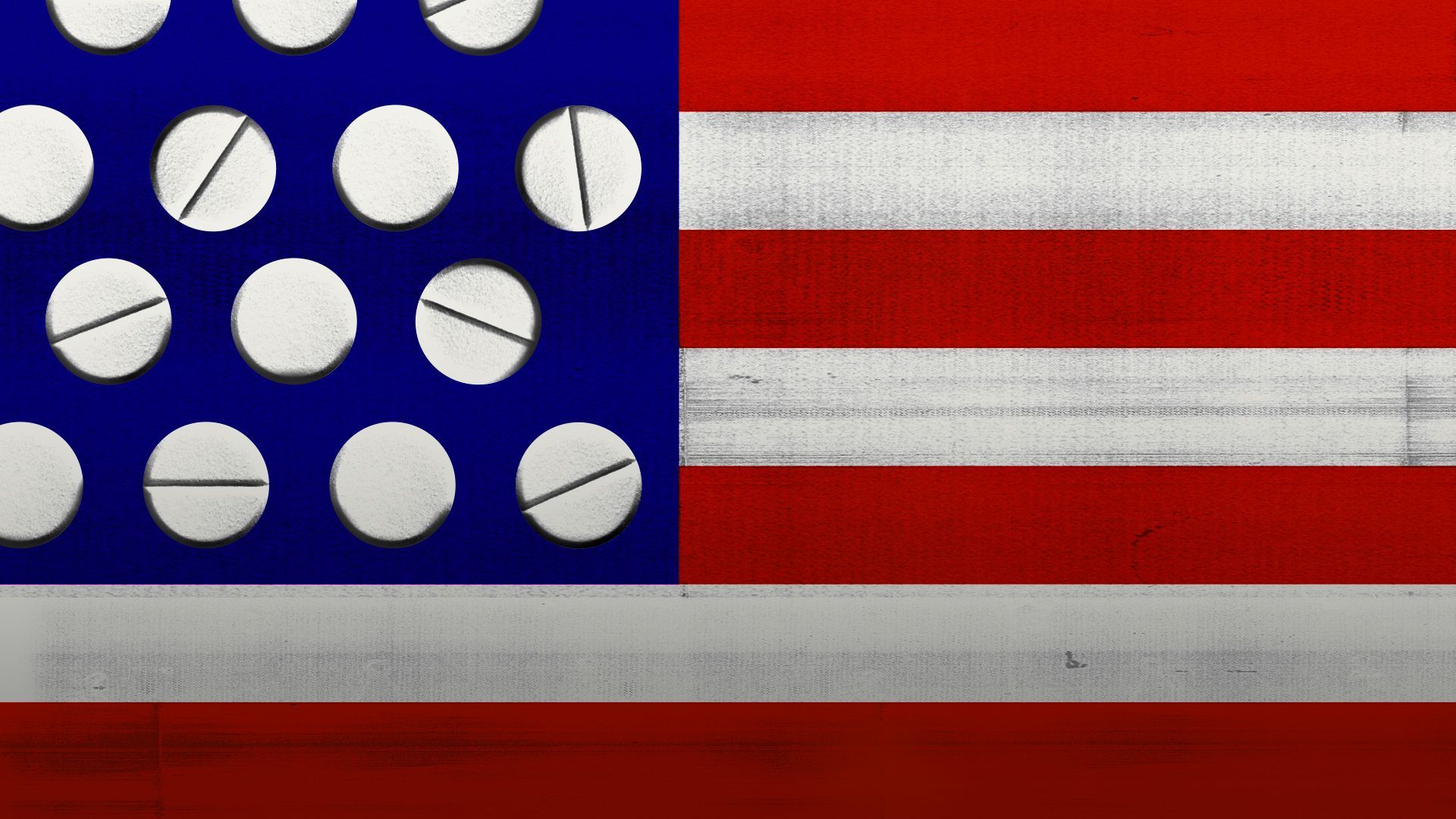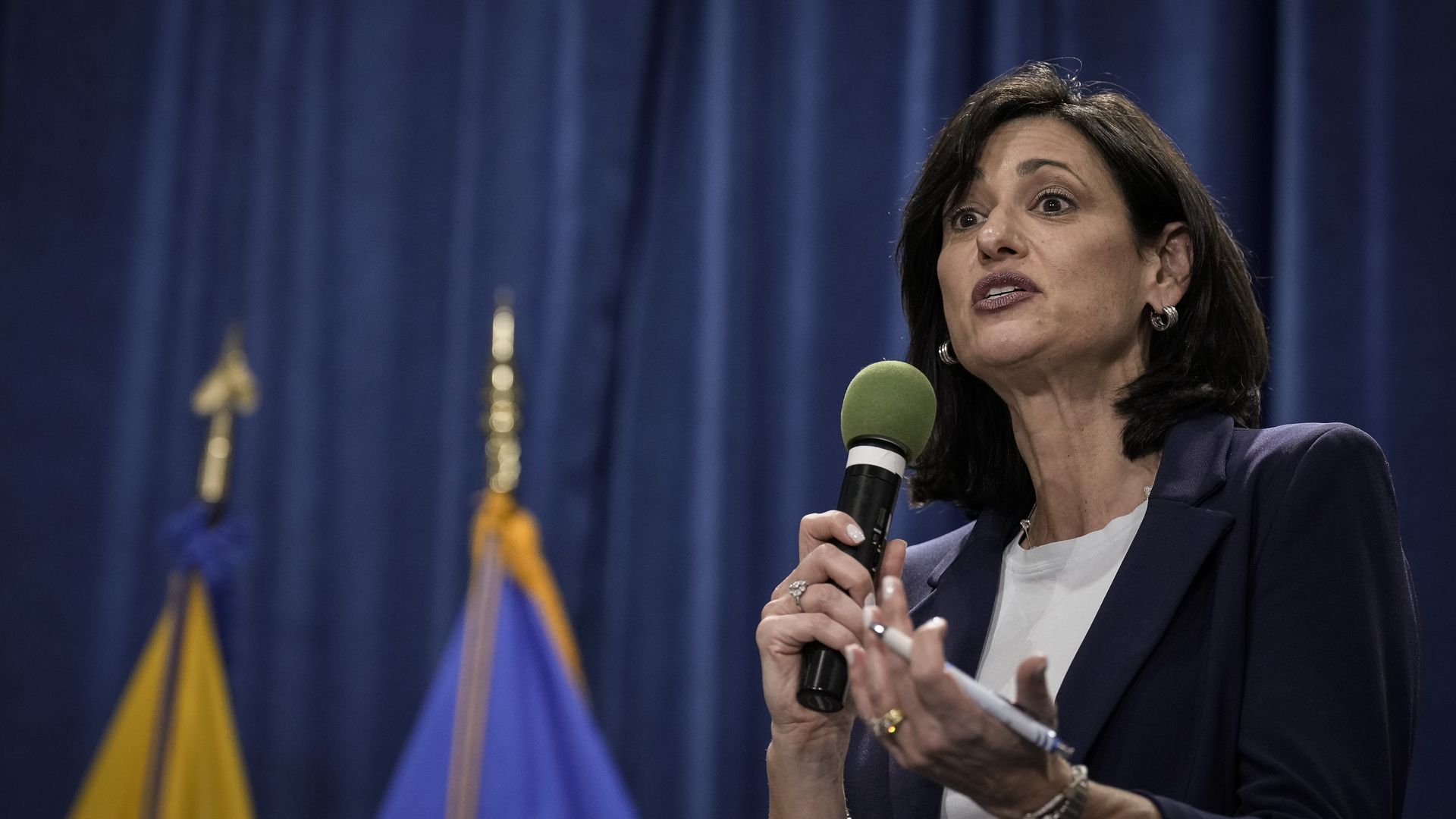| |
| |
| |
| Presented By the Healthcare Distribution Alliance |
| |
| Axios Vitals |
| By Tina Reed · Apr 21, 2023 |
| Happy Friday, Vitals readers. Today's newsletter is 1,041 words or a 4-minute read. Situational awareness: A federal judge who ruled last month that employers can't be required to cover specified preventive health care services told the Justice Department he won't be issuing an emergency stay on the ruling — for now. - He told the DOJ to first bring more evidence "that insureds will lose their coverage as suggested in Defendants' briefing," citing news reports that health insurers likely wouldn't cut off care to patients immediately.
|
| |
| |
| 1 big thing: American's pain problem |
 |
|
| Illustration: Shoshana Gordon/Axios |
| |
| The FDA's attempts to manage the overdose crisis by reining in the use of narcotics are weighing on patients with chronic pain, who say the result has been harder-to-fill prescriptions and heightened withdrawal and suicide risks, Axios' Sabrina Moreno writes. The big picture: The FDA for years grappled with criticism it helped fuel the opioid epidemic by approving products like OxyContin and a tablet 1,000 times more powerful than morphine. - Now, patient groups are concerned the agency is proposing a large study of opioids' long-term effectiveness in treating chronic pain without enough of their input.
- Addiction experts say its design could be tilted toward benefiting manufacturers.
Driving the news: FDA outside advisers this week slammed the agency's proposed study, saying it seemed built to favor pharmaceutical manufacturers. - Experts and pain care specialists criticized how the plan wouldn't address addiction risk or improve care for the millions of Americans with chronic pain.
- The National Council of Independent Living, a disability rights organization, also noted that these decisions are being made and discussed without people with chronic pain and disabilities involved on advisory boards.
- The nine-hour meeting on Wednesday came a week after the FDA announced it's now requiring both instant and extended-release opioid pain medicines to carry warnings about overdose risk and potential for increased sensitivity to pain.
Between the lines: Some chronic pain patients say the agency's latest moves have made physicians more likely to deny needed pain relief out of fear of regulatory scrutiny. - In an online public comment, Earenya Chapman wrote that "this has left patients with no alternative but to suffer in silence."
The bottom line: The U.S. continues to grapple with how to slow the addiction crisis while helping millions of Americans with conditions causing chronic pain, leaving both public health issues at risk of getting worse. Go deeper. |
    |
| |
| |
| 2. CDC still has "blindspots," Walensky says |
 |
|
| Photo: Drew Angerer/Getty Images |
| |
| Six months into an overhaul of the CDC, director Rochelle Walensky said Thursday the agency has made strides in releasing timely data and retraining staff to ensure a nimble response to future crises, Axios' Arielle Dreher reports. Yes, but: The CDC is still operating with data "blindspots" and needs more funding and authority from Congress to fix them, Walensky said at a KFF event on Thursday in San Francisco. The big picture: Last fall, Walensky tapped Mary Wakefield, a former Obama administration official, to lead a reorganization of CDC after the agency drew fire for its disjointed response and messaging missteps during the pandemic. Zoom in: The CDC cannot require states to report public health data, and this slows down responses. - Prior to the pandemic, 187 health care facilities could electronically report data to the CDC; now about 23,000 facilities can. This is just 25% of all the nation's facilities, however.
- Data agreements were not finalized during the mpox response until months after vaccines were shipped to states, she said.
- "We were responding with blindspots in our data on how and where the disease was spreading," Walensky said.
|
    |
| |
| |
| 3. Pacific Islanders vulnerable to Medicaid loss |
 Data: Center for Medicare and Medicaid Services; Chart: Tory Lysik/Axios Visuals Thousands of Pacific Islanders who went years without promised Medicaid coverage before Congress made amends during the pandemic could lose those benefits this spring in the first wave of eligibility redeterminations, Arielle writes. Why it matters: States are culling their Medicaid rolls with the end of the COVID-19 emergency, removing guarantees of continuous coverage that reduced health inequities in ways obvious and not-so-obvious. Zoom in: Consider the 94,000 individuals from the Marshall Islands, Palau and the Federated States of Micronesia now living in the U.S. While non-citizens, they're guaranteed Medicaid and CHIP benefits under a Reagan-era agreement that gave the U.S. exclusive use and control of sites in those islands for military activity. - Congress erroneously stripped the group's Medicaid benefits when drafting welfare reform legislation in 1996. That left communities exposed to the ravages of COVID-19 more than other groups before Congress restored the benefits in a year-end spending package in 2020.
- Now, some of those same individuals could be forced out of the safety net program as states redetermine eligibility requirements.
Arkansas, one of the largest Marshallese enclaves, started Medicaid redeterminations this month and will evaluate eligibility for upwards of 400,000 residents this year. - The concern is for individuals who still may qualify for benefits but could be disenrolled and lost in the administrative churn due to language barriers, erroneous contact information or other factors.
This story is a part of a reporting fellowship sponsored by the Association of Health Care Journalists and supported by The Commonwealth Fund. |
    |
| |
| |
| A message from the Healthcare Distribution Alliance |
| Data illumination in healthcare |
| |
 |
| |
| HDA's recent report provides insights on how data can be used in the healthcare supply chain. Why it's important: Illuminating the right data to the right stakeholders inside and outside of government can bolster the integrity and resilience of the supply chain. Read the report. |
| |
| |
| 4. Biden admin releases PE hospice owners data |
| HHS on Thursday posted data online showing who owns more than 6,000 hospices and 11,000 home health agencies that are reimbursed by Medicare. Why it matters: It's the latest move to cast a light on private equity's growing influence in a corner of the industry that's become a rich target for acquisitions and has been plagued with reports of fraud and dangerous cost-cutting. Between the lines: Earlier this month, Medicare officials released a proposal to require physicians who order hospice services to be enrolled in or validly opted out of Medicare in order to get paid. The bottom line: Officials say making the data available will help patients and their loved ones to make more informed decisions, even though families aren't always in a position to comparison shop when selecting these services. - The more likely benefit is that the data will allow researchers and regulators to identify owners with histories of poor performance and spot trends on how market consolidation in the sector impacts consumers — in order to address more systemic problems.
|
    |
| |
| |
| 5. Catch up quick |
| 💉 A worrying sign in the global effort to vaccinate every child. (Axios) 🏛 The DOJ charged 18 people — including doctors — in massive COVID health-care fraud takedowns. (CNBC) 🔬 The NIH has poured $1 billion into long COVID research — with little to show for it. (MuckRock and STAT News) 💰 The Biden administration vowed to be a leading voice on opioid settlements but has gone quiet. (KFF Health News) |
    |
| |
| |
| 6. Dog of the week |
 |
|
| Maddy and Anya. Photo: Martin Cooper |
| |
| Meet Maddy, a 9-year-old rescue dog rescued from an animal shelter in Lincolnton, North Carolina, and Anya, who was found roaming the streets as a kitten in Charlotte. They now spend their days enjoying indoor creature comforts together in Bellingham, Washington. - "They aren't exactly pals but have achieved a modus vivendi," writes their human, Martin Cooper.
|
    |
| |
| |
| A message from the Healthcare Distribution Alliance |
| Making the pharmaceutical supply chain more resilient |
| |
 |
| |
| A more resilient supply chain requires enhanced collaboration between the public and private sector. What you need to know: Healthcare distributors have been working with supply chain and government partners to build on collective strengths and identify ways to enhance resilience. Read more. |
| |
| Thanks for reading, and thanks to senior health care editor Adriel Bettelheim and senior copy editor Bryan McBournie for the edits. |
 | | Dive deeper into the future of health care | | |
No comments